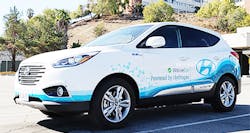Vehicle sharing program at Cal State LA saluted for sustainability
California State University, Los Angeles, has won a statewide award for its zero-emission vehicle sharing program.
The university says that its Parking and Transportation Services and its Hydrogen Research and Fueling Facility received a best practice award for sustainable transportation in the California Higher Education Sustainability Conference's 2019 Energy Efficiency and Sustainability Best Practice Awards.
The contest recognizes achievements in energy efficiency and sustainability at colleges and universities across California.
“Cal State LA continues to lead the way in introducing innovative alternative transportation options,” says Cal State LA President William A. Covino. “This award underscores our commitment to serving the public good through our sustainability initiatives.”
Cal State LA’s shared mobility program includes 10 zero-emission WaiveCar vehicles that are available for students, faculty and staff to use daily within a 30-mile radius of the university.
Commuters can leave their cars at home, take public transit to Cal State LA and book a WaiveCar for quick trips off campus for meetings, appointments or other events. The vehicles can be driven at no cost for the first two hours and $5.99 for each additional hour.
The university will be adding five WaiveCar vehicles to its fleet for the start of the fall semester.
The program is a joint initiative between Parking and Transportation Services and the Hydrogen Research and Fueling Facility. Using renewable energy resources, the facility produces fuel for hydrogen vehicles, such as the WaiveCar, which emit only water vapor emissions. The facility is part of the College of Engineering, Computer Science, and Technology.
Cal State LA has a goal of moving to 90% waste diversion by 2026 and zero waste by 2036. Zero waste means managing products, services and processes to systematically reduce and eventually eliminate the volume of waste and materials, as well as conserve and recover all resources without burning or burying.
About the Author
Mike Kennedy
Senior Editor
Mike Kennedy, senior editor, has written for AS&U on a wide range of educational issues since 1999.
